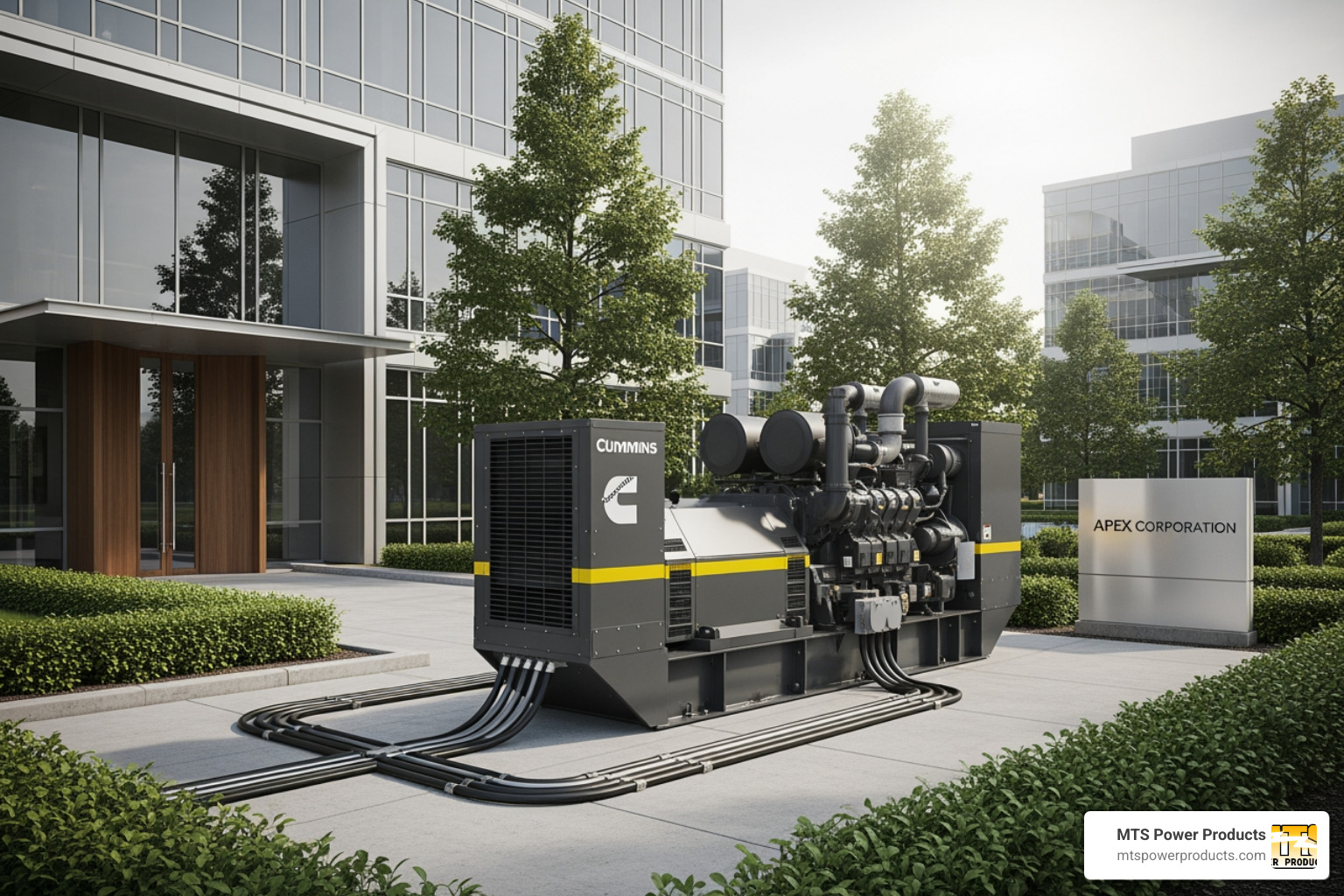
Buy Direct
from the Manufacturer
Sell our Products
Become a Distributor
Discounts
on volume purchases
Visit Us
at our Miami office
from the Manufacturer
Become a Distributor
on volume purchases
at our Miami office
When the lights go out, a generator becomes more than just equipment—it becomes your lifeline. But that peace of mind doesn’t have to break the bank. Used gen sets for sale offer that same security at prices that might surprise you.
Think about it: a quality pre-owned generator can deliver reliable power at 30-50% less than buying new. It’s like finding a low-mileage car with years of good service still ahead of it.
Take John, a manufacturing plant manager in Miami who recently purchased a refurbished 250kW Caterpillar generator. “I was skeptical at first,” he admits, “but this unit had only 600 hours on it—practically new in generator terms—and saved us nearly $40,000 compared to buying new.”
| Quick Facts: Used Gen Sets | Details |
|---|---|
| Price Range | $1,099 (small portable) to $165,000+ (industrial) |
| Popular Brands | Caterpillar, Cummins, Kubota, Yamaha, Honda, Generac |
| Power Capacity | 1kW to 4000kW (most common: 7-20kW residential, 100-350kW industrial) |
| Best Places to Buy | Specialized dealers, online marketplaces, auctions, surplus equipment sales |
| What to Check | Operating hours, maintenance records, load test results, emissions compliance |
The second-hand generator market is surprisingly diverse. You’ll find everything from compact inverter models perfect for camping to industrial powerhouses that can keep an entire hospital running. And many have barely been used—it’s not uncommon to find units with fewer than 100 operating hours despite being several years old.
Some of the best finds come from hospital and government surplus. These generators typically undergo rigorous maintenance schedules and regular testing, making them exceptionally reliable despite being “used.” Rebecca, a homeowner in South Florida, found a 20kW hospital backup generator that had been replaced during an upgrade. “It was six years old but had only run during monthly tests,” she says. “Now it’s my hurricane insurance policy.”
Of course, not every used generator is a hidden gem. The key is knowing what questions to ask and what to look for before handing over your hard-earned money. Operating hours are like mileage on a car—lower is generally better. Maintenance history tells you if the unit has been properly cared for. And a verified load test confirms the generator can actually deliver the power it promises.
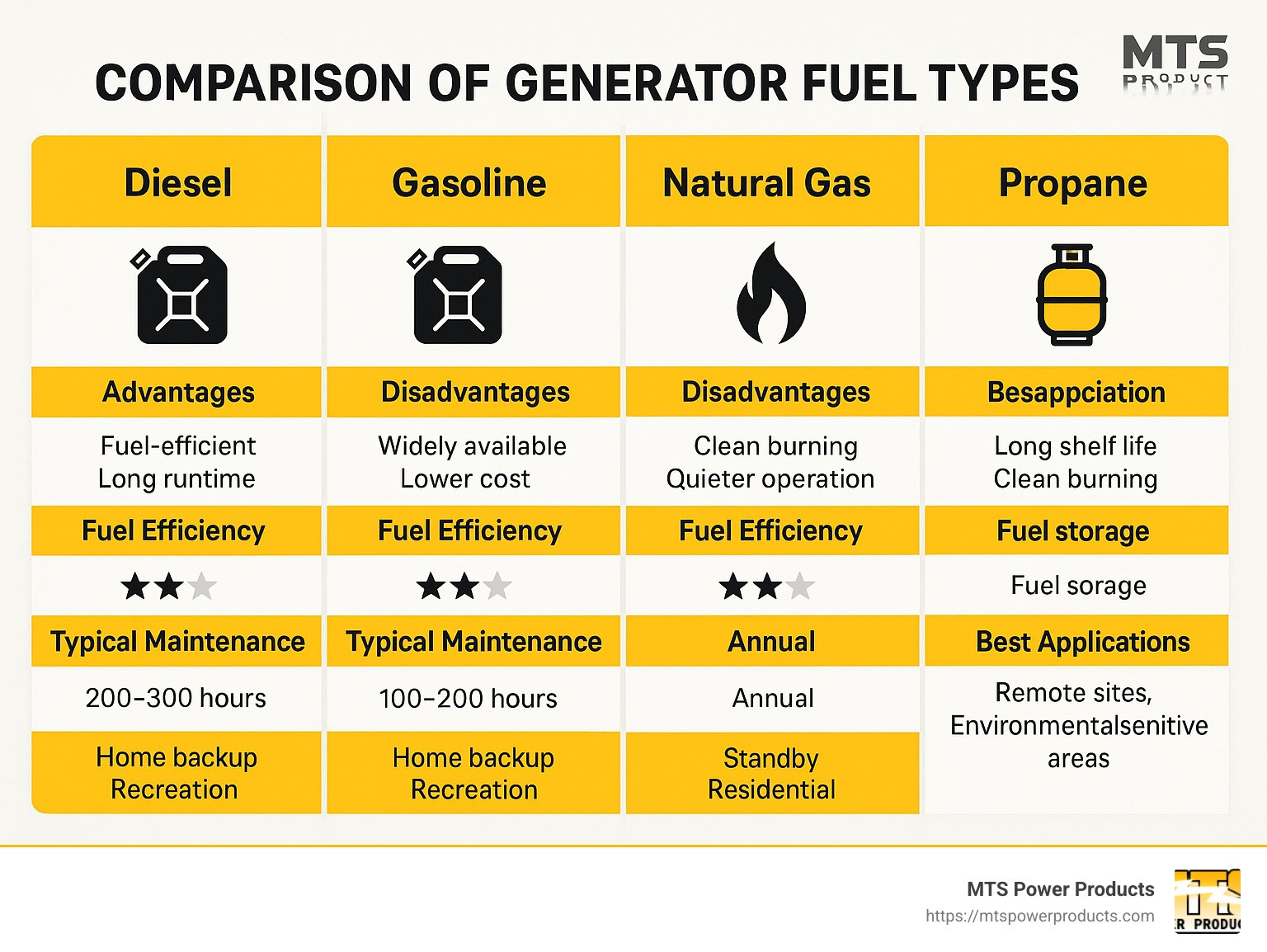
Your power needs might also benefit from modern approaches like smart energy management and smart power management systems, which can optimize how your generator operates.
Whether you’re protecting a business from costly downtime or ensuring your family stays comfortable during storm season, a quality used generator can provide the security you need without the premium price tag. With a little knowledge and careful shopping, you can find reliable power that’s gentle on your budget.
When exploring used gen sets for sale in 2024, you’ll find an impressive variety of options that can save you significant money while still delivering reliable power. Whether you need something portable for camping trips or a industrial-grade unit for your manufacturing facility, there’s a pre-owned generator out there with your name on it.
Diesel generators remain the workhorses of the commercial and industrial sectors, and for good reason. A well-maintained used diesel gen set can reliably run for 15,000-30,000 hours before needing major work – that’s like buying a used car with 50,000 miles that could still go another 150,000! Popular models like the Caterpillar XQ350 and Cummins 6BTA series frequently appear on the second-hand market with plenty of life left in them.
Natural gas generators have been gaining serious traction, especially in areas with existing gas infrastructure. These units produce fewer emissions than their diesel counterparts and eliminate the headache of on-site fuel storage. If your facility already has natural gas lines, models like the Generac SG series and various Kohler units offer excellent value on the used market.
For homeowners and small businesses, gasoline portable generators remain the most accessible option. Brands like Honda, Yamaha, and Generac have established themselves as the gold standard in this category, with the Honda EU series and Yamaha EF series being particularly coveted for their reliability and impressive fuel efficiency.
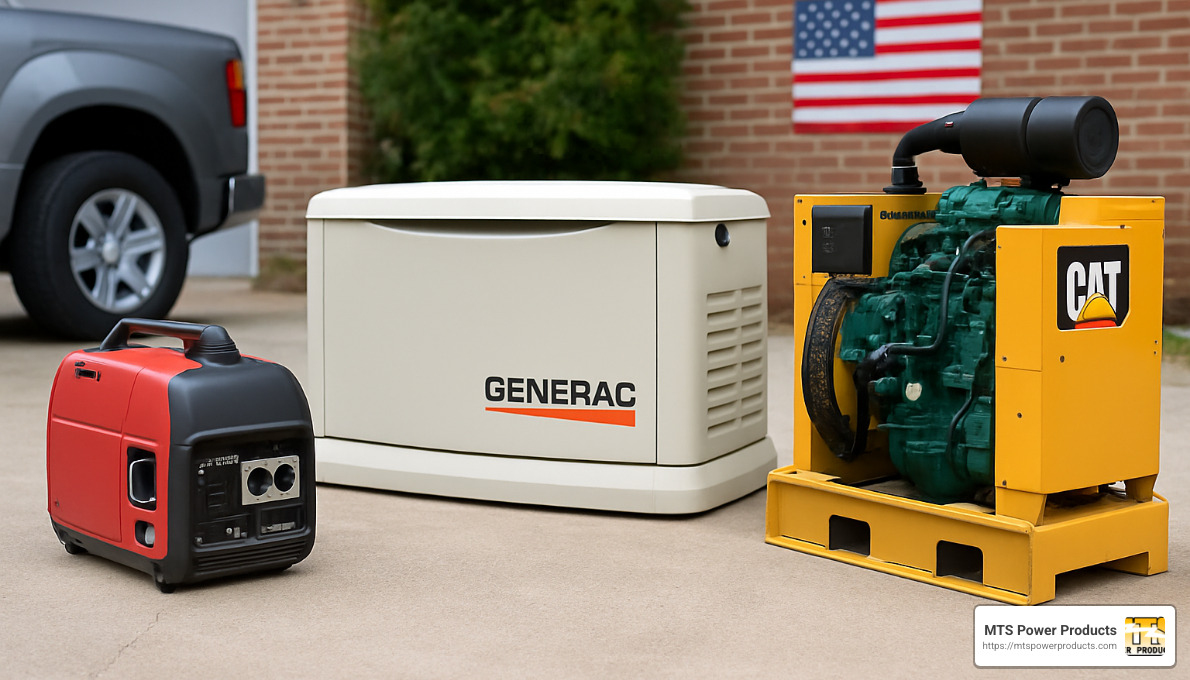
Here’s a quick comparison of some top used generator models currently available:
| Model | Fuel Type | Power Output | Typical Used Price | Common Applications |
|---|---|---|---|---|
| Caterpillar XQ350 | Diesel | 350 kW | $40,000-$70,000 | Industrial, data centers |
| Cummins 6BTA | Diesel | 100-150 kW | $15,000-$30,000 | Commercial, construction |
| Kubota GL7000 | Diesel | 7 kW | $4,000-$7,000 | Small business, residential |
| Generac 22 kW | Natural Gas | 22 kW | $3,500-$6,000 | Residential, small business |
| Honda EU7000is | Gasoline | 7 kW | $2,500-$4,000 | Residential, events |
| Yamaha EF2200iS | Gasoline | 2.2 kW | $800-$1,200 | Recreational, small backup |
| Winco 25/15PT2 | PTO-driven | 25 kW | $1,500-$3,000 | Agricultural |
| CAT SR4 | Diesel | 175 kW | $15,000-$25,000 | Industrial, commercial |
Need power that can go where you go? Portable used gen sets for sale offer incredible flexibility at budget-friendly prices. These units typically range from 2kW to 20kW – perfect for everything from camping trips to construction sites.
The Yamaha EF2200iS is a true gem in the portable inverter category. You can often find these units used for around $1,000-$1,300 – a substantial savings over new. They deliver clean, stable power that won’t fry your sensitive electronics, run at a neighbor-friendly 57-65 dBA (about as loud as normal conversation), and can keep humming for over 10 hours on a single tank at quarter load. They’re perfect for RV enthusiasts, campers, or homeowners who just need to keep the essentials running during an outage.
The Honda EU7000iS is another standout performer, delivering a robust 7,000 watts of clean inverter power. Used models typically go for $2,500-$4,000 depending on condition and hours – a nice discount from the $4,500+ price tag when new. These generators have earned a cult-like following for their whisper-quiet operation, impressive fuel efficiency, and that legendary Honda reliability that keeps them running for years.
Mike Reynolds, a contractor from Florida, shared his experience: “I snagged a used Honda EU7000iS with just 155 hours for $3,200, about 40% less than new. It’s powered multiple job sites flawlessly for two years now, and the inverter technology means I can run my sensitive equipment without worry.”
For those needing serious portable power, the Multiquip WhisperWatt series offers industrial-grade durability in a towable package. Used models in the 20-25kW range often sell for $8,000-$12,000 – making them popular choices for construction companies and event planners who need reliable power wherever the job takes them.
When it comes to powering entire facilities or providing critical backup for commercial operations, stationary used gen sets for sale in the 100-350kW range are the backbone of reliable power. These heavy-duty units typically come skid-mounted or in weatherproof enclosures, designed to provide years of dependable service.
The Caterpillar XQ350 exemplifies industrial-grade power that frequently appears on the used market. These units house the robust CAT C13 diesel engine capable of pumping out 350kW of prime power. Used models with 5,000-7,000 hours (which is still young for these beasts) can often be found for $40,000-$70,000 – representing massive savings over new units that easily exceed $100,000.
Hospital surplus generators are the hidden treasures of the used generator world. These units undergo rigorous maintenance schedules and regular testing to meet strict healthcare facility requirements. Finding a hospital-grade Kohler or Cummins generator with 1,000 hours or less is like finding a certified pre-owned luxury car with low mileage – exceptional quality at 40-50% below the price of new.
Sarah Johnson, facilities manager at a manufacturing plant in Miami, shares her success story: “We acquired a 250kW Cummins generator from a hospital upgrade project. The unit had only 994 hours despite being five years old and came with complete maintenance records showing monthly load testing. At $35,000, it was less than half the price of a new equivalent, and has performed flawlessly during our hurricane season power outages.”
These larger units typically offer three-phase output capability as standard, making them suitable for industrial applications requiring 208V, 240V, or 480V three-phase power. Many used industrial generators also provide the flexibility to switch between prime power mode (for continuous operation) and standby mode (for emergency backup), giving you versatility for different operational needs.
Thinking about buying a used gen set for sale? Smart move! You’ll save a bundle compared to new equipment, but you’ll want to be sure you’re getting a reliable power partner, not a money pit. Let’s walk through how to evaluate that generator before you hand over your hard-earned cash.
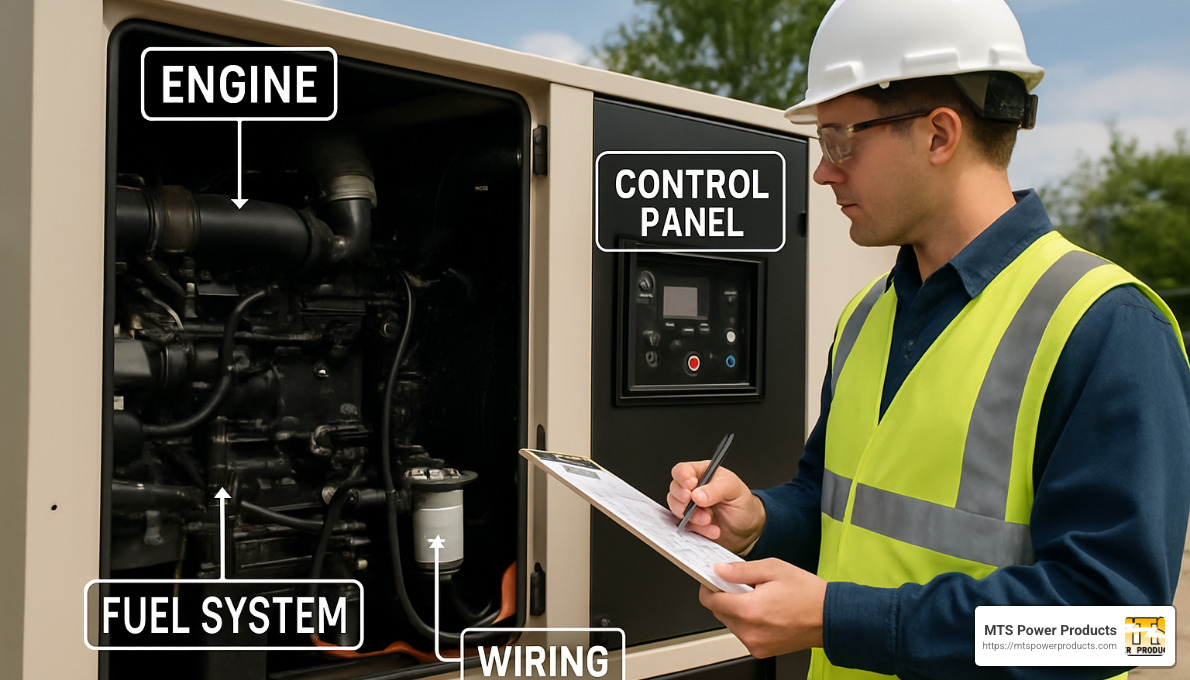
Think of buying a used generator like adopting a dog – you want to know its history, see how it behaves, and make sure it’s healthy before bringing it home. First things first, take a good look at the engine condition. Any oil leaks? Unusual smoke when it runs? Strange knocking sounds? These are all red flags that could signal expensive problems down the road.
Always ask to see the service logs. A well-maintained generator should have documentation showing regular oil changes, filter replacements, and coolant services. If the seller looks at you blankly when you ask for maintenance records… well, that tells you something too!
The load bank test is your new best friend in this process. This test confirms the generator can actually produce its rated power without overheating or faltering. Many reputable dealers will perform this test before sale or let you witness it yourself. It’s like taking a used car for a test drive – absolutely essential.
Modern generators come with digital controllers that store operational data and fault codes. Having a technician review this information can reveal recurring issues the seller might not mention. It’s like checking a patient’s medical history before surgery.
Don’t forget to check the emissions tier compliance. Older units might not meet current regulations in your area, potentially limiting when and where you can use them. For deeper insights specifically about diesel options, check out our guide on buying a diesel generator for sale.
When you’re face-to-face with sellers of used gen sets for sale, asking the right questions can save you from buyer’s remorse:
“What are the total running hours on this unit?” This is like asking the mileage on a used car – it helps you gauge wear and tear.
“When was the last major service performed?” Regular maintenance is the key to generator longevity. Major services typically happen every 250-500 hours for smaller units and 500-1,000 hours for larger ones.
“Is there any warranty remaining?” Some used generators still have transferable manufacturer warranties or dealer guarantees.
“Why are you selling this generator?” The answer can be revealing. An upgrade or business closure is fine, but if they start sweating and mumbling, proceed with caution!
Robert Chen, a data center manager I spoke with recently, shared an interesting experience: “When I purchased our used 100kW Caterpillar generator, the seller was upfront about a previous injector replacement. Rather than scaring me off, their transparency actually increased my confidence. They provided documentation of the repair by a certified technician and subsequent testing, which showed they weren’t hiding issues.”
Don’t forget practical matters like shipping arrangements and costs – large generators can be expensive to transport. And yes, many dealers offer financing for used equipment, which can help manage cash flow for your business.
Beyond the conversation, several technical assessments can give you objective data about a generator’s health:
Oil analysis works like a blood test for your generator. This lab test reveals internal engine wear by identifying metal particles and contaminants in the oil. If the seller has these reports, they’re gold!
Insulation resistance testing (sometimes called a “megger test”) evaluates the alternator’s insulation condition. Poor insulation can lead to electrical shorts and generator failure. Think of it as checking the integrity of your home’s electrical wiring.
Vibration analysis can identify problems before they cause catastrophic failure. Excessive vibration often signals misalignment, bearing wear, or other mechanical issues that might not be visible to the naked eye.
Maria Gonzalez, a power equipment technician at MTS Power Products, puts it perfectly: “We always perform fluid analysis and load testing on used generators before purchase. These tests have saved our customers from buying units with hidden problems numerous times, and the cost is minimal compared to the potential expense of a failed generator.”
According to scientific research on equipment reliability, generators with documented maintenance histories and regular testing show significantly higher reliability rates than those without. For critical applications, investing in professional inspection before purchase is like buying insurance – a small cost that can prevent major headaches later.
A quality used generator can provide years of reliable service when you’ve done your homework. Take your time, ask the right questions, and when in doubt, bring in a professional to help with the evaluation. Your future self (and your power-dependent operations) will thank you!
Understanding current market pricing for used gen sets for sale helps ensure you’re getting a fair deal. Prices vary widely based on size, brand, age, hours, and condition, but here are some general benchmarks based on recent market data:
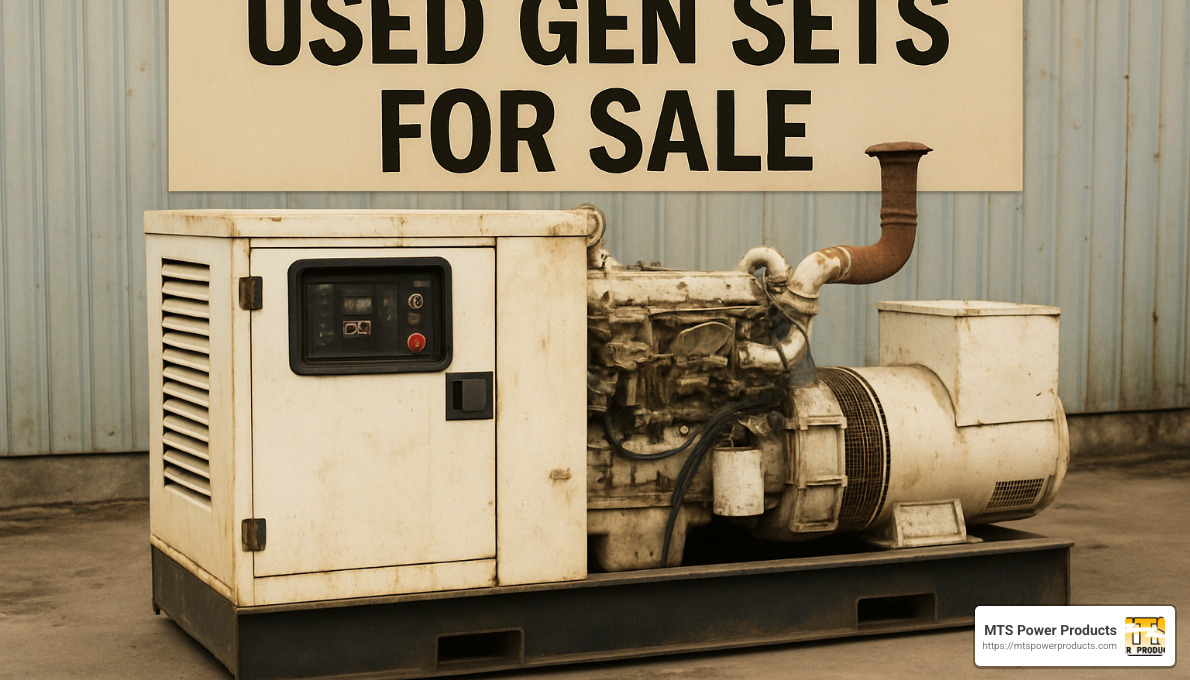
You’ll find the used generator market spans from budget-friendly $1,099 portable units to industrial powerhouses exceeding $165,000. The depreciation curve is fairly predictable – expect a 20-30% drop in the first year, followed by 10-15% annually for the next few years. After that, well-maintained equipment tends to hold its value surprisingly well.
The Caterpillar SR4 generator continues to be the darling of the industrial segment. These workhorses typically fetch between $15,000-$25,000 for a 175kW unit, depending on hours and condition. Their legendary durability and readily available parts make them a safe bet for applications where failure isn’t an option.
For smaller needs, the compact Kubota Lowboy II series (GL7000 and GL11000) delivers remarkable reliability. A used GL7000 with around 1,000 hours will typically run you $4,000-$7,000, giving you 7kW of power backed by Kubota’s renowned diesel dependability.
In the portable category, the Yamaha EF series, particularly the EF2200iS inverter generator, reigns supreme. These clean-power champions can be found used for $800-$1,200 in good condition – a substantial savings over the $1,349 new price tag.
When shopping for used gen sets for sale, your budget will largely depend on the size and fuel type you need:
In the 1-5 kW range, primarily portable units, expect to pay $500-$3,000 for gasoline inverter generators, $1,500-$5,000 for diesel portables, and $700-$2,500 for propane models.
Moving up to the 20-60 kW range for residential or small commercial applications, diesel standby generators typically run $4,000-$15,000, while natural gas/propane alternatives go for $3,500-$12,000. Trailer-mounted portable diesel units in this range fetch $7,000-$20,000.
The commercial/industrial 100-350 kW range sees diesel generators priced between $20,000-$100,000, with natural gas versions slightly higher at $25,000-$110,000. If you need weatherproofing or containerization, add another $5,000-$20,000 to your budget.
For large industrial needs (500+ kW), diesel generators start around $75,000 and can exceed $165,000, while natural gas and bi-fuel systems range from $85,000-$200,000+.
“We’ve found that well-maintained diesel generators in the 100-200kW range offer the best value proposition for most of our commercial clients,” explains Carlos Rodriguez, Sales Manager at MTS Power Products. “They typically sell for 40-50% less than new while still offering 10,000+ hours of reliable service before major overhaul.”
Fuel type doesn’t just affect your initial purchase – it shapes your long-term operating costs too. Diesel units command premium prices thanks to their durability and efficiency, but in areas with affordable natural gas and existing infrastructure, gas-powered units can be more economical to run day-to-day.
Some brands and models have earned rock-star status in the used generator market through their proven reliability, parts availability, and overall value:
Cummins XQ Line generators are beloved by construction crews and event companies for their mobility and sound-attenuated design. Powered by the bulletproof Cummins QSB engine series, used XQ models with 3,000-5,000 hours typically sell for 50-60% of new pricing.
Honda Inverter Series units like the EU2000i, EU3000is, and EU7000is are the gold standard for portable power. Their exceptional build quality means even units with 2,000+ hours often command 60-70% of original retail. When you find one in good condition, don’t hesitate – they don’t stay on the market long.
Generac Standby Generators dominate the residential and light commercial landscape with models from 7kW to 60kW. A used 22kW Generac with under 500 hours might cost you $3,500-$6,000, compared to $5,000-$7,000 new (plus installation costs).
For our farming friends, PTO-Driven Units from brands like Winco and Winpower offer excellent value. These generators connect to a tractor’s power take-off, with used 25kW models available for just $1,500-$3,000.
Perhaps the best-kept secret in the used generator world is Government Surplus equipment. Military and government generators are typically built to exacting specifications and maintained with religious dedication. MEP series military generators (like the MEP-805B 30kW diesel) often surface with astonishingly low hours.
“I’ve purchased multiple government surplus generators over the years,” shares Frank Miller, a disaster preparedness consultant. “They’re typically overbuilt, carefully maintained, and have detailed documentation. My MEP-805B had only 3,312 hours – less than a month of actual use – despite being over 10 years old.”
The right used generator can deliver years of reliable service at a fraction of new pricing. The key is knowing your power needs, understanding market pricing, and focusing on quality brands with proven track records. And remember – a generator with higher upfront cost but better fuel efficiency might save you money in the long run, especially for frequent or continuous use applications.
Finding quality used gen sets for sale doesn’t have to feel like searching for a needle in a haystack. The good news is that several reliable sources exist where you can find well-maintained equipment that won’t break the bank.
Specialized dealers like MTS Power Products offer perhaps the most peace of mind when shopping for used generators. These companies focus exclusively on power generation equipment and typically put their pre-owned units through rigorous testing before offering them to customers. Many even include limited warranties—something you won’t find from most private sellers.
“Last year, I was skeptical about buying used,” shares Thomas Reynolds, a small business owner in Tampa. “But the dealer walked me through their testing process and even showed me the maintenance records from the previous owner. The generator has been flawless through two hurricane seasons now.”
Online marketplaces have revolutionized how we shop for used equipment. Sites like Machinery Pete, IronPlanet, and eBay currently list hundreds of generators ranging from tiny 1kW portables to massive 350kW industrial units. The filtering options on these platforms are particularly helpful—you can narrow your search by location, price range, fuel type, and dozens of other specifications.
If you’re hunting for a serious bargain, equipment auctions might be your best bet. Companies like Ritchie Bros. regularly auction off power generation equipment, often from businesses upgrading their fleets or unfortunately closing their doors. While auction prices can be temptingly low, most auction items sell “as-is” with limited inspection opportunities. It’s a higher-risk, higher-reward proposition.
Don’t overlook local equipment resellers in your search. Rental companies, electrical contractors, and supply houses frequently rotate their generator inventory and may offer used units with well-documented histories. These local connections can also save you significantly on shipping costs, which is no small consideration for larger generators.
Speaking of hidden gems, hospital and government surplus equipment deserves special attention. These institutions typically follow strict maintenance schedules and often upgrade their emergency power systems according to fixed timetables rather than actual need. This means you might find exceptionally well-maintained generators with surprisingly low hours and carefully kept service records.
For buyers in South Florida, MTS Power Products offers a distinct logistical advantage. Located just minutes from both Miami International Airport and the Port of Miami, they provide convenient access to Generator Sets for Sale in Miami with options for local pickup or efficient worldwide shipping.
When purchasing from distant sellers, don’t forget to factor in shipping costs. Moving a large generator across the country isn’t like shipping a package through the mail. For units above 100kW, shipping expenses typically range from $1,500 to $5,000 or more, depending on distance and accessibility. Always get shipping quotes before finalizing a purchase to avoid unpleasant surprises.
If you’re willing to pay a bit more for extra peace of mind when buying used gen sets for sale, certified pre-owned programs offer compelling benefits.
Cat Certified Used generators represent the gold standard in the industry. These units undergo exhaustive inspection and reconditioning processes that bring them as close to new condition as possible. While they command higher prices than typical used equipment, they often include warranties comparable to new units while still offering substantial savings.
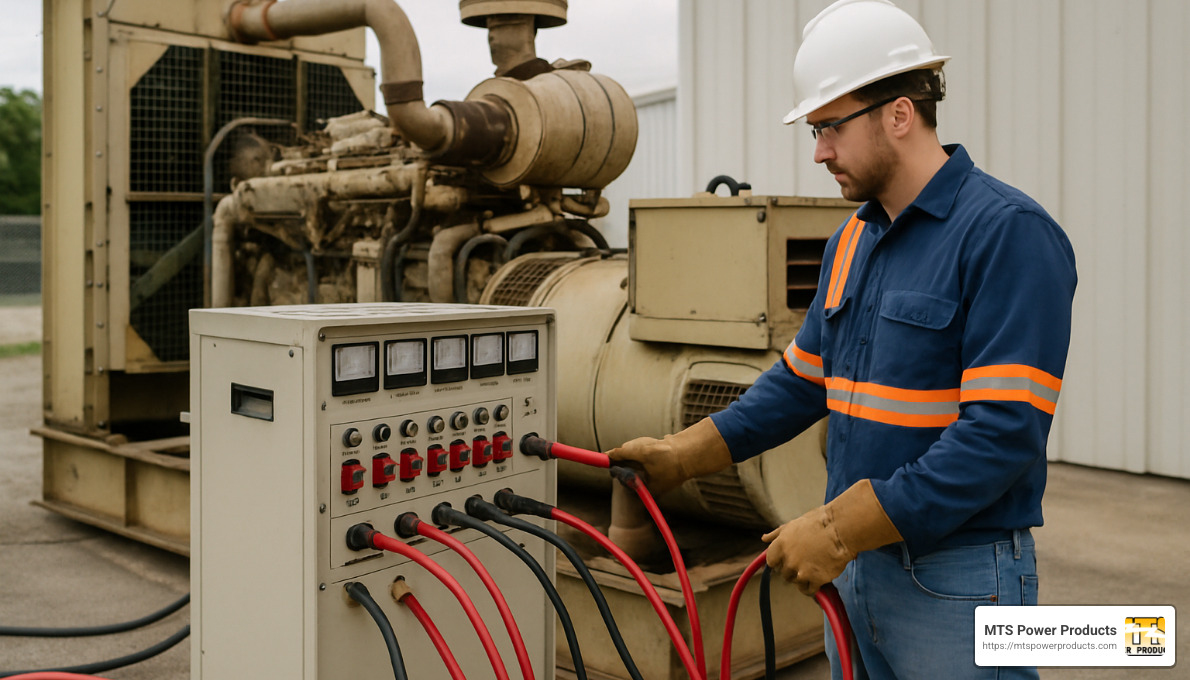
The IronClad Assurance program available through IronPlanet auctions strikes a nice balance between cost and confidence. Generators with this designation have been professionally inspected with detailed condition reports available before you bid. This transparency helps take some of the gambling aspect out of auction purchases.
Hospital pull-outs are perhaps the industry’s best-kept secret. Due to strict healthcare regulations, these generators typically receive maintenance that goes above and beyond standard practices. Monthly load testing, detailed service logs, and regular professional inspections are the norm rather than the exception.
“We recently found several hospital generators being replaced during a scheduled upgrade,” shares Michael Torres from MTS Power Products with a smile. “Despite being five years old, they had less than 500 hours each—that’s like buying a five-year-old car with just 2,500 miles on it. Every bit of maintenance was documented, right down to the date each oil filter was changed. Our customers who purchased these units essentially got nearly-new generators at used prices.”
For those seeking professional backing with their purchase, MTS Power Products offers thoroughly inspected Generator Sets for Sale with optional extended warranty coverage. Their technicians perform comprehensive evaluations including load testing under various power demands, fluid analysis to detect internal wear, and control system diagnostics to ensure everything functions correctly when you need it most.
Taking care of your used gen set for sale isn’t just about protecting your investment—it’s about ensuring power when you need it most. With proper maintenance, a quality used generator can deliver reliable service for many years to come.
Fuel management is perhaps your most critical ongoing concern. Diesel fuel can be particularly troublesome when left sitting for extended periods, as it tends to develop algae and sediment that wreak havoc on filters and injectors. I’ve seen perfectly good generators fail during emergencies simply because of neglected fuel. If your generator runs infrequently, consider adding a fuel stabilizer and scheduling periodic fuel polishing services to keep your diesel clean and ready.
“I learned the hard way about fuel quality after Hurricane Irma,” shares Todd from Naples. “My generator wouldn’t start when we needed it most because the diesel had turned to sludge after sitting untouched for two years. Now I treat the fuel every six months without fail.”
Your generator’s cooling system deserves special attention too. Engine coolant should be tested regularly for proper concentration and pH levels. Most manufacturers recommend a complete coolant change every 1-2 years, regardless of operating hours. The protective additives in coolant break down over time, even when the generator isn’t running.
For backup power systems, proper integration with an Automatic Transfer Switch (ATS) is essential. Have a qualified electrician verify compatibility between your used generator and existing or new transfer switch equipment. The last thing you want during an outage is for your generator to run perfectly while your transfer switch fails to connect the power to your building!
Modern technology has made generator monitoring easier than ever. Consider adding remote monitoring capabilities to your used generator. These systems can send alerts to your phone when issues arise or maintenance is due. There’s nothing like the peace of mind that comes from getting a notification that your generator has automatically started during a power outage while you’re away from home.
Safety should never be an afterthought when operating or maintaining generators. Always use appropriate Personal Protective Equipment including hearing protection (many generators exceed 85dB), gloves, and eye protection during maintenance. Your safety is worth more than any convenience gained by skipping proper precautions.
For more comprehensive information on backup power systems, including detailed maintenance schedules and best practices, check out our guide on Backup Generator for Sale.
The maintenance needs for portable and stationary generators differ significantly, and understanding these differences will help you keep your specific unit in top condition.
Portable generators require more frequent attention due to their design and typical usage patterns. Plan on changing the oil every 50-100 operating hours—much more frequently than their stationary cousins. If you’re using your portable generator in dusty conditions (like construction sites), check the air filter every 25 hours and clean or replace it as needed.
Gasoline-powered portables need regular spark plug inspection and replacement. The smaller fuel tanks and carburetors in portable units are also more vulnerable to fuel quality issues, so always use fresh fuel and consider draining the carburetor if the unit will sit unused for more than a month.
“I make it a point to run my portable generator for about 30 minutes every month, with a load connected,” explains Maria, an RV enthusiast from Miami. “This keeps everything lubricated and identifies any issues before I’m relying on it in the middle of nowhere.”
Stationary generators typically enjoy longer service intervals but require more comprehensive inspections. Oil changes generally come at 250-500 hours depending on the model, but don’t neglect your cooling system. Radiator cleaning is essential, especially in dusty or high-pollen environments where airflow can become restricted.
Battery maintenance is critical for stationary units that might sit idle for months between power outages. Check terminals for corrosion, keep connections tight, and consider a load test annually to ensure the battery will perform when needed.
Regardless of which type you own, maintaining a detailed log of all services, run hours, and observations helps track performance trends and anticipate needs. This documentation also significantly adds value if you eventually resell the unit.
Before purchasing a used gen set for sale, research parts availability and consider stocking critical components. While parts for major brands like Caterpillar, Cummins, and Generac typically remain available for 10-15 years after production ends, proprietary components for lesser-known brands can be frustratingly difficult to source.
“We recommend our customers keep a ‘critical spares’ kit on hand for their used generators,” advises James Wilson, Parts Manager at MTS Power Products. “Having items like filters, belts, hoses, and a starter solenoid available can mean the difference between a minor inconvenience and a major outage during an emergency.”
At MTS Power Products, we’re just minutes from Miami International Airport and the Port of Miami, making us perfectly positioned to help with all your generator maintenance needs—whether you need advice, parts, or professional service for your used gen set for sale.
Sizing a generator correctly isn’t just about buying power—it’s about matching your specific needs with the right equipment. When our customers ask this question, I always start by helping them calculate their total power requirements.
For a quick estimate, add up the wattage of everything you’ll need to run simultaneously, then add about 20% as a safety cushion. This buffer gives you room for growth and prevents your generator from running at maximum capacity all the time.
For homes, the sizing typically falls into three common ranges:
– 7-10 kW generators handle the basics—your lights, refrigerator, and a few critical outlets
– 12-20 kW units can back up most of an average home (though usually not central air)
– 20-30 kW systems provide complete backup including those power-hungry air conditioners
Commercial situations get more complex. I’ve seen businesses purchase generators that were too small because they didn’t account for motor starting surges or power factor issues. That’s why David Martinez, one of our engineers at MTS Power Products, always reminds customers: “It’s better to have slight excess capacity than to overload your generator. Overloading not only causes premature failure but might void whatever warranty you have left.”
If you’re running a business or industrial facility, I strongly recommend getting a professional load analysis. The investment in proper sizing pays dividends in reliability when you need that power most.
This question reminds me of asking how many miles are too many on a used car—the answer depends on several factors beyond just the number on the meter. With used gen sets for sale, the acceptable hour range varies dramatically by type and quality.
For smaller portable gasoline generators, 2,000-3,000 hours is considered high mileage. I’ve seen well-maintained units with 500-1,000 hours that still have years of reliable service ahead of them.
Residential standby generators often show surprisingly low hours—many accumulate less than 100 hours annually since they only run during outages or monthly tests. Finding one with 500-1,000 hours that’s been properly maintained is usually a great value.
Commercial diesel generators are the workhorses of the industry. Quality diesel engines can run 15,000-30,000 hours before needing major overhaul work. Units in the 5,000-10,000 hour range are often in their prime—broken in but not worn out.
For industrial generators used in continuous duty applications, the lifespan extends even further. Many run 40,000-60,000 hours before major rebuilds, making 15,000-20,000 hour units potentially excellent investments.
What matters more than the absolute number is how the generator was used and maintained. I’ve seen 10,000-hour generators that look better internally than some 2,000-hour units. The difference? Maintenance history and load patterns. A generator that’s been regularly serviced and run at moderate loads will outlast a neglected unit that’s been constantly maxed out.
Yes! Many customers are surprised to learn that quality used gen sets for sale can be financed and insured much like new equipment.
For financing, you have several practical options. Many dealers (including us at MTS Power Products) offer in-house financing programs for qualified buyers. Equipment-specific loans from banks typically require 10-20% down payment, with terms ranging from 2-7 years depending on the generator’s age and value.
Some customers prefer lease-to-own arrangements, which can lower your monthly payments. As Carlos Mendez, our Finance Manager, often tells customers: “Many people are surprised to learn they can finance a quality used generator with warranties similar to new units, often at half the monthly payment.”
Insurance coverage is equally accessible. Business insurance policies typically cover used generators as capital equipment. If you’re installing a standby unit at home, your homeowner’s policy may need a specific rider for full coverage—worth checking before installation.
For additional peace of mind, extended service plans are available from many dealers and third-party providers. If you’re investing in a high-value industrial generator, I recommend looking into specialized equipment breakdown coverage that can protect against major repair costs.
The bottom line? Don’t let concerns about financing or insurance steer you away from the value of a quality used generator. With proper documentation and condition verification, you can protect your investment while enjoying the substantial savings compared to buying new.
Finding the right used gen set for sale requires careful research, thorough inspection, and a clear understanding of your power needs. The journey through the second-hand generator market might seem daunting at first, but armed with the right knowledge, you can find reliable backup power at a fraction of the cost of new equipment.
After helping hundreds of customers find their perfect power solution, we’ve seen how a smart purchase can provide years of dependable service. Let’s recap the most important things to remember:
First, verify condition rigorously before making any purchase. Those operating hours, maintenance records, and load test results tell the true story of a generator’s health – much like a medical checkup reveals a person’s wellbeing. A generator with 10,000 hours and perfect maintenance might outperform one with just 1,000 hours that’s been neglected.
Second, look beyond the price tag and consider the total cost of ownership. That bargain-priced generator might cost you more in the long run if it guzzles fuel or requires hard-to-find parts. As Maria from Tampa told us after purchasing a used Caterpillar: “I paid a bit more upfront, but I’m saving thousands each year on fuel compared to my old unit.”
Third, match the generator to your needs with careful sizing. An undersized generator will struggle and eventually fail under heavy loads, while an oversized unit wastes fuel and can develop harmful “wet stacking” when consistently run below its optimal capacity. Finding that Goldilocks “just right” size makes all the difference.
Fourth, plan for maintenance from day one. Budget for regular service and keep critical spare parts on hand – especially filters, belts, and common electrical components. This small investment prevents the major headache of extended downtime when something eventually needs attention.
Finally, understand the resale value dynamics of different brands and models. Quality generators from manufacturers like Caterpillar, Cummins, and Kohler typically hold their value better over time. This matters not just for future selling, but also speaks to the overall quality and reliability of these trusted brands.
For South Florida businesses and residents, MTS Power Products offers unique advantages as your generator partner. Our Miami location, just minutes from both the Miami International Airport and Port of Miami, provides convenient access to our inventory of quality used generators. Our team’s expertise in custom power solutions ensures you get exactly what you need, not just what happens to be in stock. For more information about commercial backup options, visit our guide on commercial backup generators.
Whether you’re protecting your family from hurricane-related outages, powering a remote construction site, or ensuring your business stays operational during grid failures, a quality used generator set delivers peace of mind without breaking your budget. With proper selection, installation, and care, your used generator investment will stand ready to deliver reliable power whenever and wherever you need it – often for many years to come.